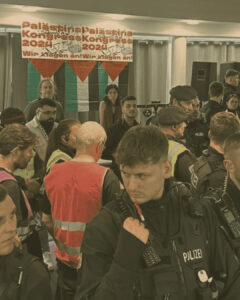
Silencing Solidarity: Europe’s lawfare against pro-Palestine activism
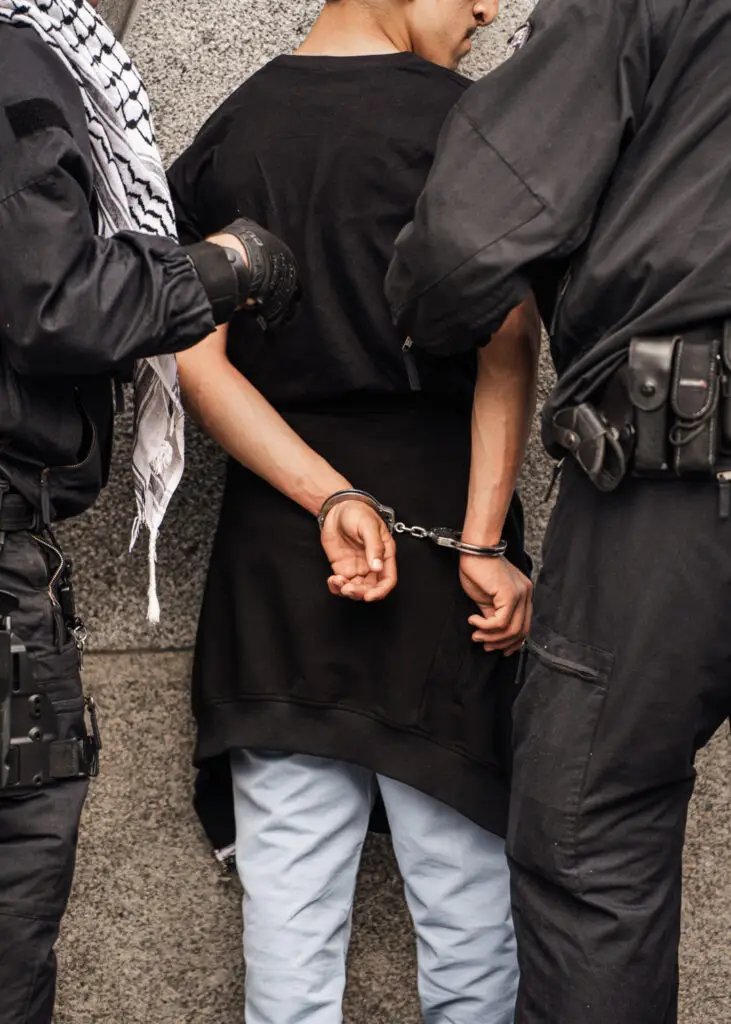
One month into the genocide in Gaza, London’s Metropolitan Police Service issued a public appeal urging pro-Palestine organisations to postpone any protests. The police commissioner had defied calls from the government to ban the protests, stating that there was no intelligence to suggest that the protests would pose any threat or violate any law. Yet, this did not prevent the police from calling upon people not to participate in the protest. Soon after, Declassified UK revealed that senior officers in the London police including the commissioner, had long been accepting invitations and gifts from an Israeli think tank closely tied to its government, intelligence and military establishment. In January this year, the British government invited Oded Basyuk, the Israeli general who heads the Israel Defence Forces’ Operations Directorate, to attend official meetings with the United Kingdom’s defence ministry, foreign office and cabinet office.
In September last year, the German interior ministry stated that individuals who used the pro-Palestinian slogan, “From the river to the sea, Palestine will be free,” can be denied German citizenship. In a significant development for migrants, Germany had passed a new citizenship law a few months earlier, fast-tracking the naturalisation process and allowing applications for dual citizenship. The condition concerning the Palestinian slogan emerged in the context of this law, ostensibly targeting pan-Arab solidarity with Gaza, given that Germany hosts a large number of immigrants and refugees from Syria, Turkey and Palestine.
In fact, in August, a German court even convicted a woman for chanting the slogan and fined her €600, with the judge ruling that the statement was not protected by free speech because it denied Israel’s right to exist. Another trial that was scheduled to start that month was postponed last minute. “Police are using quite severe offence charges to justify brutal violence against protestors,” the activist facing trial said. “In the past few months, dozens of people have been beaten to a state of unconsciousness during police crackdowns and had to be hospitalised with severe injuries; some have had their homes raided just for saying ‘From the river to the sea.’”
In Italy, two unauthorised protests denouncing the genocide in Gaza were met with disproportionate use of force by the riot police in the cities of Pisa and Florence last February. Media reports and video footage showed the police attacking participants—largely high school students—as they tried to march through both cities to the main squares. Children were among those who suffered injuries as a result of police violence. As the videos surfaced, the Italian president, Sergio Mattarella, issued an unprecedented statement addressed to the Minister of the Interior criticising the police. “With young people, the use of batons is an expression of failure,” the president said. But police repression has continued.
These incidents are neither rare nor disconnected: they form part of a concerning pattern of suppression of pro-Palestinian activism visible across Europe in recent years. This pattern includes police crackdowns, legal restrictions, and excessive use of force during peaceful protests, all of which also reflect an alignment of European states with Israeli policies. While in Israel these policies can be openly Zionist, in Europe, they take the shape of strategic lawfare that erodes the democratic right to protest, while amplifying state power to suppress dissent. In Germany, the UK and in Italy, the state response to pro-Palestinian activism has been marked by a securitisation of protests and the weaponisation of laws, such as anti-terror legislations, against protesters. With the ceasefire agreement hopefully bringing an end to a 15-month genocide, it is important to look at how European states suppressed the global movement for Palestine.
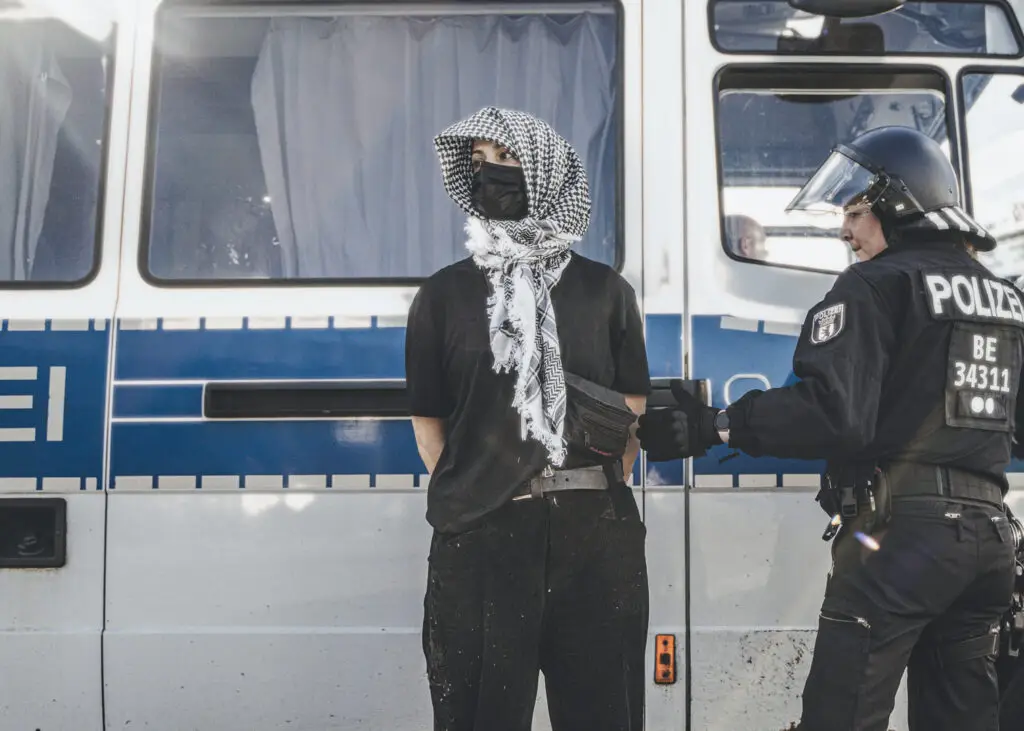
The weaponisation of antisemitism laws
“Germany is known for its slow bureaucracy, but right after 7/10, the speed with which they passed laws targeting the Palestinian resistance in the country is unmatched,” observed a Munich-based activist who requested to remain anonymous. He was referring to a series of resolutions passed by the German parliament—the Bundestag—to “combat the growing wave of antisemitism in the country.” Last November, the Bundestag passed a controversial resolution that mandates that public grants for cultural and scientific projects must be contingent on the organisations adhering to the definition of antisemitism by the International Holocaust Remembrance Alliance (IHRA). The resolution states: “The Bundestag reaffirms its decision to ensure that no organizations or projects that spread antisemitism, question Israel’s right to exist, call for a boycott of Israel or actively support the Boycott, Divestment, Sanctions (BDS) movement receive financial support.”
The resolution followed closed-door consultations, without any public consultation, which is usually the norm for such resolutions. In an editorial published shortly after the resolution was passed, a leading German public broadcaster, Deutschlandfunk, described the Israeli lobbying that preceded the resolution. “Behind closed doors, MPs, ministers and party leaders complain about the pressure they have been subjected to from various sides in recent months: from pro-Israel lobby organisations, the Israeli embassy and the Central Council of Jews on the one hand, and from lawyers, scientists and artists on the other,” the editorial noted. “The debate has long been toxic. The fear of being defamed as an anti-Semite and Israel hater by the Bild newspaper”—a widely read German tabloid—”also affects the highest ranks of politics.”
To understand better the legal framework in which this resolution was passed, I spoke to Alice Garcia, the head of advocacy and communications at the European Legal Support Centre (ELSC). “The root of the legal weaponisation of antisemitism laws is the definition of antisemitism by the International Holocaust Remembrance Alliance itself, because it’s not accurate,” Garcia said. The IHRA lists out eleven examples of activities considering antisemitic, which includes, “drawing comparisons of contemporary Israeli policy to that of the Nazis’’ and “claiming that the existence of a State of Israel is a racist endeavour.”
In essence, the IHRA conflates criticism of Israel with antisemitism, and as such, renders it practically impossible to conduct any pro-Palestinian activism during a genocide of its people without being accused of being antisemitic. The definition has become the basis for legal discrimination against the Palestinian right to criticise Israel’s actions. Although the definition is promoted by the IHRA itself as not legally binding, it is de facto implemented as law.
Passed in 2016, the IHRA definition has had an enormous influence, with 43 countries adopting it, including 25 countries of the European Union, the UK and the US. In fact, the UK was the first European government to formally adopt the IHRA, on 12 December 2016. Germany adopted the IHRA’s definition of antisemitism in 2017, which led to a series of policies and actions that drew widespread criticism.
The ELSC documented the use of the IHRA definition to suppress Palestinian advocacy in the EU and the UK in a report from June 2023. In the UK, the report noted, the adoption of the IHRA was followed by the introduction of policies that curtailed pro-Palestinian activism. The government dissuaded local councils and even administrators of pension funds from adopting any actions as part of the BDS movement, and threatened to discontinue funding for universities that did not implement the IHRA definition on campus. In Germany, too, municipal councils, states, and city administrations all implemented the IHRA by passing resolutions prohibiting any BDS activity. These resolutions have led to the denial of public space and funding to individuals and organisations supporting BDS.
The report further noted that the EU has “actively promoted the adoption and implementation” of the IHRA definition by its member states. “In doing so, the EU has demonstrated its unwillingness to address concerns about the ambiguity of the definition and its problematic conflation of criticism of Israel with antisemitism,” it adds. The European Commission even released a “Handbook for the practical use of the IHRA definition of antisemitism” in January 2021.
The handbook recommended training law enforcement officials to recognise hate crimes, and creating the position of a commissioner for antisemitism—a guideline that Germany implemented in 2018, with the creation of the Office of the Federal Government Commissioner for Jewish Life in Germany and the Fight Against Antisemitism. In a December 2023 essay for The New Yorker, Masha Gessen wrote that since the creation of the government office, Germany has reported “an almost uninterrupted rise in the number of antisemitic incidents: more than two thousand in 2019, more than three thousand in 2021, and, according to one monitoring group, a shocking nine hundred and ninety-four incidents in the month following the Hamas attack.” However, Gessen points out that this conflates criticism of Israel and incidents involving any violence—and the latter, has remained consistent and significantly lower throughout, including following the Operation Al-Aqsa Flood attacks of October 2023.
“If Israel is the parent of this genocide, Germany is indeed its grandfather,” said a young activist from France who moved to Berlin in 2018, and requested to remain anonymous. She told me that she had to stop making videos about Palestine on social media because of the Islamophobic hatred she received. “I’m a black Muslim woman with progressive ideas, but unfortunately, I’m being perceived as “too radical” for this country. I’m seen as representing Hamas or being an anti-Semite, which is not true. I had to stop for my well-being. I’ve almost stopped talking or writing about Palestine for fear of legal action against me; it’s very easy not only to be reported but also to be convicted, and I always have to remember that I’m black and that I come from an already disempowered group.”
The use of the IHRA’s definition in Germany has serious implications for freedom of expression and assembly and human rights violations, and clearly shows the worrying tendency to conflate criticism of Israel with antisemitism. Numerous experts, including the E. Tendayi Achiume, the former United Nations Special Rapporteur on contemporary forms of racism, have expressed concern about the impact of the definition on fundamental human rights.
In an October 2022 report, reflecting on the key trends of racism observed during her five-year mandate, the Special Rapporteur recommended that UN member states immediately suspend the adoption and promotion of this definition and its attached examples. She stated that the definition and its examples were “wielded to prevent or suppress legitimate criticisms of the State of Israel.” The following week, 128 scholars from across the world, including Jewish academics, issued a statement welcoming Achiume’s report, and urging the UN against adopting the IHRA’s “vague and weaponized definition of antisemitism.”
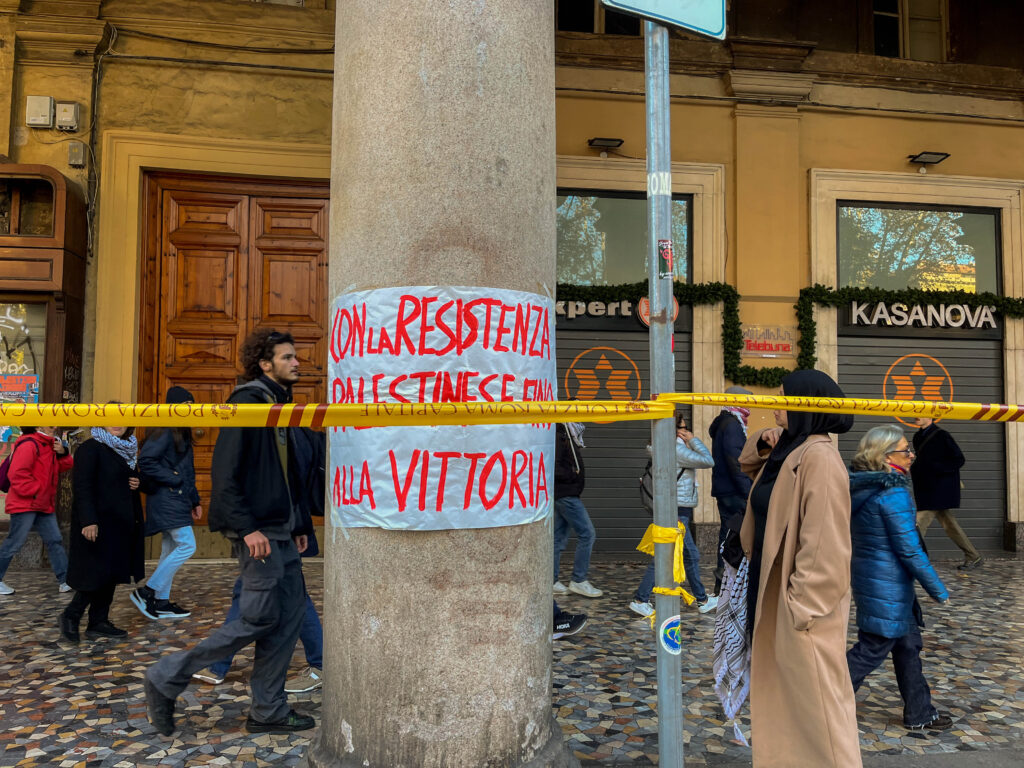
When pro-Palestine activism becomes terrorism
The weaponisation of laws against Palestinian solidarity goes beyond the use of the IHRA—activism and advocacy for Palestine has even led states to invoke counter-terrorism laws. “The anti-terrorist squad raided my home and accused me of inciting hatred through my Instagram account for speaking out against Israel,” said Giuseppe Flavio Pagano, a photographer and former journalist. Now an activist with over 50,000 followers on Instagram, Pagano has been speaking out about the ongoing genocide in Palestine since October 2023. “The instrumental use of the law against hate speech is becoming more and more clear, it’s being used to target pro-Palestinian activism.”
Pagano believes he was targeted for exposing the group “Israel without filters,” which is known for its hate speech against Palestinians, and which he found to be linked to Marco Carrai, an honorary consul of Israel in Italy. Carrai, a Florence-based entrepreneur, has made headlines over the past decade for being described as the henchman of the former Italian prime minister Matteo Renzi. Pagano revealed ties between Carrai and the hate group’s administrators. In fact, Karem Rohana, a Palestinian activist based in Florence, said he has also been targeted by Carrai in retaliation for his anti-Zionist criticism. “He has accused activists of fomenting antisemitism or even possibly terrorism.”
In Germany, the police have banned Samidoun, a Palestinian solidarity network, accusing it of funding terrorist organisations. Founded in 2012, Samidoun campaigns for the release of Palestinian prisoners in Israeli jails. Thomas Hofland from Samidoun Netherlands dismissed the German police’s accusations outright. “We do not provide any form of material support to any resistance organisation in Europe or elsewhere,” Hofland said. “We provide political support through writing and speeches to resistance groups and prisoners. After our ban in Germany, other organisations have stepped up to support Palestinian prisoners, who have also been subjected to repression by the German government.”
The ban on Samidoun also had consequences for people who have simply supported it in the past. The Munich-based activist recalled a protest he attended after the organisation was banned, where he saw people targeted by the police and then arrested simply for having a Samidoun sticker on their backpack. German authorities even carried out raids on properties linked to suspected Samidoun members.
Zaid Abdulnasser, a Syrian-born Palestinian refugee living in Berlin and a former member of the Samidoun and Masar Badil—or Palestinian Alternative Revolutionary Path—movements, has been threatened with deportation because of his political activities. He was denied his right to work and travel. In many interviews, he stated that this measure was not limited to him, but that other people were also being targeted because of their immigration status.
Just like Germany and Italy, the UK is no stranger to the use of the law to stifle pro-Palestinian activism, and the trend is becoming increasingly alarming. CAGE International, a London-based advocacy organisation that works on the abuse of counter-terrorism policies, has documented the repression against Palestinian solidarity in the UK. According to the CAGE press office, many activists were forced to take part in the British government’s controversial “Prevent” programme, a counter-terrorism initiative that targets those deemed at risk of radicalisation and becoming terrorists. “The Prevent programme had a real impact on people’s ability to express themselves before the 7th of October,” CAGE’s press officer said. “After that date it only got worse, as we have documented.”
The CAGE press office explained that the Counter-Terrorism and Security Act of 2015 is one of the key tools in this repressive arsenal. “That legislation originally intended to combat terrorism has been used to target and harass Muslims and now pro-Palestinian activists, or simply protesters, as in the case of Marieha Hussain.”
Marieha Hussain’s case sparked international outrage when she was targeted for a placard she made in November 2023 during a massive rally of hundreds of thousands of protesters in London. Hussain’s placard depicted the former British prime minister and home secretary, Rishi Sunak and Suella Braverman, as coconuts—brown on the outside, white on the inside. After the protest, Hussain was targeted by pro-Israeli X accounts accusing her of racism and tagging the Metropolitan Police’s account. The MET police replied that they were “actively looking for her,” and that she was charged with a racially aggravated public order offence.
Hussain, a mother of two, also had her home raided, and had to quit her job as a teacher and move home while pregnant with her third child. She was subsequently found not guilty by the judge. Naila Ahmed, the head of Campaigns at CAGE International, stated in a press release: “It’s scandalous that a heavily pregnant mother ever needed to stand trial for expressing a political opinion. This prosecution has been vindictive from the very start … The state is increasingly exploring insidious ways to prosecute activists, especially those taking action for Palestine.”
Following the start of Gaza’s genocide, a group of students and members of the London School of Economics started protesting the university’s financial involvement in the Israeli arms industry. An estimate by one LSE student group found that the university had a whopping £48 million worth of assets in 13 companies directly linked to the genocide. LSE became the first British university to evict a pro-Palestine encampment. Seven students were identified, banned from the campus and disciplined for associating with terrorism simply because they protested on 7 July, the anniversary of the 2005 London bombings.
Another case of lawfare against dissent is that of the Filton 10—a group of Palestine Action’s activists aged 21 to 30 who were arrested after a protest against Elbit Systems, a major Israeli arms manufacturer. These activists had targeted Elbit Systems’ Filton factory, causing over £1 million in damages. While six were arrested on-site in August 2024, four others were later apprehended in counter-terrorism police raids—one at gunpoint. Despite facing non-terror offences, they were detained for a week without charges and eventually denied bail, leaving some to face up to 17 months in prison before their trial begins in November 2025. Several human rights violations have been registered such as solitary confinement, being denied of reading materials, religious practices, medical privacy and limited communication with other prisoners.
These activists faced a level of punitive control more akin to a counter-terrorism scenario than a peaceful protest. The case demonstrates how governments leverage the language of national security and counter-terrorism to justify measures that stifle activism, mirroring the patterns observed in student and academic spaces under the IHRA framework.
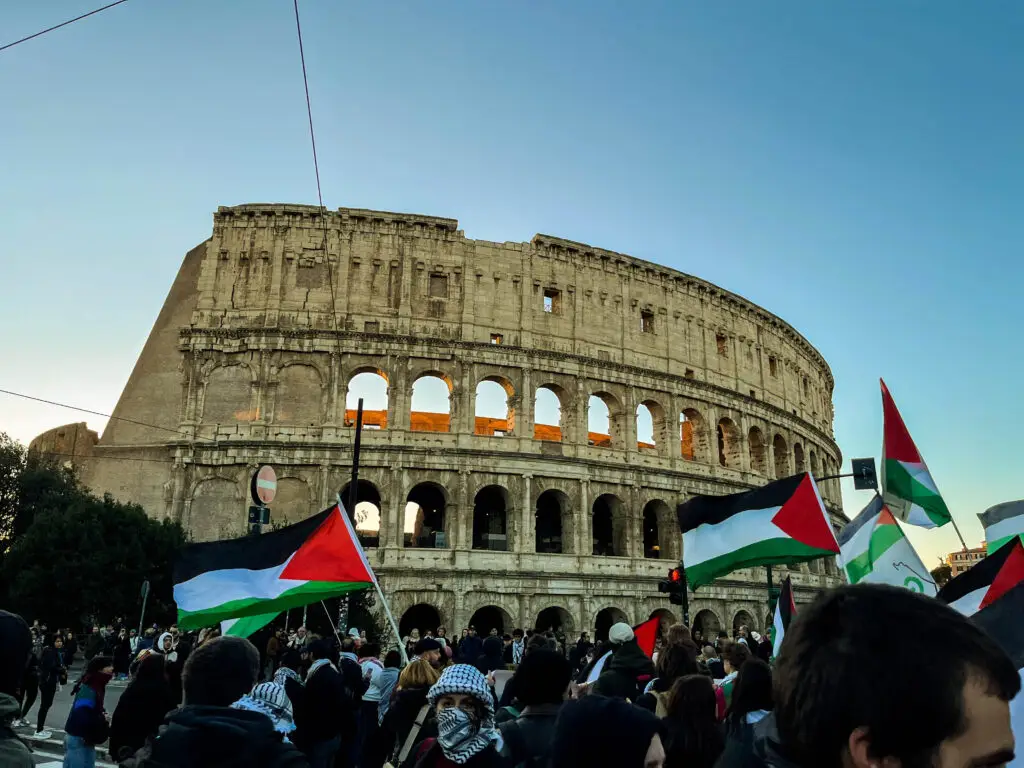
Securitisation of protests
Under the far-right government of Giorgia Meloni, the crackdown on dissent in Italy, particularly pro-Palestinian activism, has intensified alongside a broader securitisation of public life. The country has seen a rise in state surveillance and the criminalisation of solidarity with Palestinian rights.
This trend is linked to a rise in authoritarianism and intolerance of dissent, with a record of disproportionate police repression in response to demonstrations and protests related to Palestine. A member of the activist group Giovani Palestinesi d’Italia—the Young Palestinians of Italy—spoke to me on the condition of anonymity about the police repression they have faced in the country, requesting to be identified by the pseudonym Hussein. “The first example that comes to mind is the ban on our protests on 27th January 2024, Holocaust Remembrance Day,” Hussein said. “In Milan, we have been protesting every Saturday since 7th October 2023, and coincidentally, that day was a Saturday too. The National Department of Public Security banned pro-Palestinian rallies in the whole country that day.” Ignoring the ban, many rallies were held throughout Italy, and some were again met with police brutality.
Despite the president’s intervention, the repression against pro-Palestinian activism continued, and among the worst of it was seen on 5th October 2024, during the National Demonstration for Palestine in Rome. The Young Palestinians of Italy and other pro-Palestinian organisations announced the demonstration in early September. Two weeks before it was scheduled to take place, the city police issued a pre-emptive ban, noting that “the initiative could have taken on connotations that were detrimental to the commemorative spirit of the victims of the racial laws targeting Jewish people in Italy.” It was referencing Mussolini’s fascist regime racial laws, active from 1938 to 1944, which brutally targeted Italian Jews leading them to displacement and the holocaust.
I took part in the protest in Rome, and I was surprised by the sheer number of people taking part in the protest. Grassroot movements, associations and protesters sympathising for the Palestinian cause flocked in Rome in the early hours of that Saturday. “Palestinian-led mobilisations are gaining momentum and that the demands from the movement are increasing,” said another member of the Young Palestinians of Italy, who had travelled to the protest from Bologna. “As demands rise, the state, which has no intention of stopping being complicit, is forced to curb mobilisations.”
Hours before the protest was due to begin, the Italian police verbally informed the organisers that the ban had been partially lifted, with many preventive measures still in place. As thousands flocked to Rome, demonstrators reported being surveilled, fined, and, in some cases, physically removed. An Amnesty International report noted that “preventive controls and ID checks were established on numerous access routes” to Rome and within the city. Dozens of activists were detained in various police stations across the city for several hours without any reason. The report also notes that many individuals were issued “presence-banning orders” instructing them to leave the city within an hour. The police used water cannons, tear gas and batons against largely peaceful protesters, without warning and without having attempted to de-escalate the situation.
According to the member, the police’s repressive measures have ironically led to an increase in support for the movement. “When repression becomes visible, people are more motivated to help,” the Bologna-based member of Young Palestinians for Italy said. “This was evident on 5th October. Newcomers to the movement and political activism are understandably intimidated by such events. However, these incidents attract those with prior experience, strengthening the movement. Conversely, they can also deter others, particularly given our community’s heightened risk of marginalisation. It’s not easy to approach when there is repression.”
Unsurprisingly, Italy is not alone in the securitisation of protests.
The Amnesty report on the right to protest in Europe noted that three days after Operation Al-Aqsa Flood, Braverman wrote a letter to police chiefs in England and Wales urging a “stronger police presence” at all pro-Palestinian protests. She also raised concerns about specific chants, such as “From the river to the sea, Palestine will be free”, suggesting that such expressions could be interpreted as incitements to violence or racially aggravated offences.
The implications of such directives extend far beyond policing tactics at protests. Students and academics have also found themselves increasingly targeted for their criticism of Israel. In its report on the IHRA definition of antisemitism and its impact on protests, the ELSC documented numerous cases where student activists were sanctioned for sharing pro-Palestinian content on social media or organising events such as Israeli Apartheid Week. This has created a climate of fear, where the boundaries of acceptable dissent are dictated by vague and politicised definitions.
In December 2023, CAGE International published a report titled “Censoring Palestine: From Schools to Workplaces.” It found that cases of repression against Palestinian solidarity in the UK increased by 445%, from 47 incidents in 2021, to 214 incidents documented between 9th October and 14th December 2023. The majority of documented cases involved schools and colleges targeting pro-Palestinian students. There were 35 cases of individuals arrested and charged under an anti-terrorism law. The report also notes that of the 214 cases, 209 involved Muslims, and 13 mosques that were subjected to Charity Commission investigations—raising concerns about Islamophobia and racial profiling in the UK.
In Germany, too, the authorities pre-emptively banned several pro-Palestine protests and demonstrations. “Chanting ‘From the river to the sea’ is considered a criminal offence,” the Munich-based activist said. “It’s genocidal speech to them and it’s in the IHRA definition. Many people have had their homes raided because of an Instagram post. They are becoming a common practice, we are very cautious and have taken precautions, and one of them is legal insurance. Police scare-tactics are the norm now during protests and sometimes they even target minors.” Last September, video footage went viral showing German police chasing a 10-year-old boy carrying a Palestinian flag during a protest in Berlin. The boy ran away, clearly frightened, when officers approached him during a protest in Berlin. He was caught and taken into custody.
The pattern of state repression of pro-Palestine activism by securitising protests is visible across the European continent. The Amnesty report points to the use of excessive force by the police in Belgium, France and Greece as well. In Austria, Switzerland and The Netherlands, law enforcement authorities dispersed protest camps within university campuses, in violation of the right to free assembly. “The spurious grounds of ‘public order’ or ‘public safety’ used to ban or severely restrict Palestine solidarity demonstrations fail to comply with the three-pronged test of legality, necessity and proportionality,” the Amnesty report notes.
Perhaps most importantly, though, this has not dissuaded the protesters.
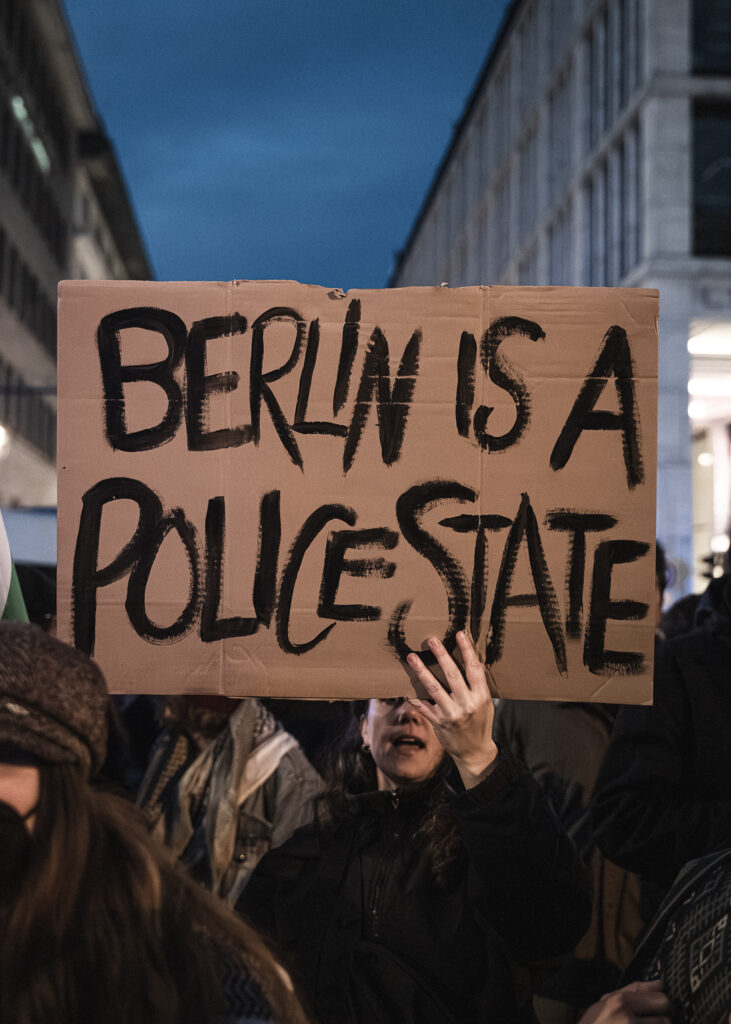
The fight for democracy and solidarity in Europe
The crackdown on pro-Palestinian activism across Europe reveals a disturbing pattern of repression, where governments increasingly prioritise state power and political alliances over the democratic rights of their citizens. The measures adopted by states such as Germany, Italy and the UK have created a climate of fear and insecurity that silences dissent and isolates those who dare to speak out.
While reporting this story, the reluctance of many activists to come forward was a recurring theme, many of them speaking on the condition of anonymity. Several expressed concerns about being surveilled or targeted for their words and actions, a fear that reflects the heightened risks associated with pro-Palestinian advocacy in Europe. Media framing has exacerbated this climate, portraying Palestinian solidarity movements as dangerous or extremist, and discouraging open discussion. As one activist in Germany put it, “Even talking to a journalist feels like a risk. The media is quick to paint us as threats, and that perception sticks.”
Despite this repression, solidarity for Palestine persists, albeit in different forms and degrees across the continent. Even as countries like Germany, the UK, and Italy adopt increasingly authoritarian measures, others like Spain and Ireland have shown a willingness to stand in support of Palestinian rights. In Ireland, where solidarity with anti-colonial struggles is deeply rooted in their own history, the government has been more vocal in criticising Israeli policies. Spanish cities like Barcelona have suspended relations with Israel over its treatment of Palestinians, reflecting a more progressive stance that contrasts sharply with the securitized approaches seen elsewhere in Europe. Both countries have joined South Africa’s case against Israel for genocide before the International Court of Justice.
These examples offer a glimmer of hope in an otherwise bleak landscape. They demonstrate that the repression of dissent is not inevitable and that there is room for European governments to choose a different path—one that upholds democratic values and respects the right to protest. The actions of Spain and Ireland serve as reminders that international solidarity and accountability are possible, even in politically contentious matters.
The stakes, however, remain high. The intersection of historical guilt, counter-terrorism frameworks, and international alliances has created an environment where criticism of Israeli policies is conflated with hate speech, and activism is treated as a security threat or even terrorism. This not only stifles pro-Palestinian voices but also undermines the broader right to protest, setting a dangerous precedent for all social movements.
“From the point of view of the government and the state, marginal sectors of society are more exposed to exploitation and thus also to the response to exploitation,” Hussein said. “Job and legal insecurity determine the greater capacity of the state to intervene and to be more fugitive; it makes them easier targets to identify. In addition to repression in the police sense, there is also repression of marginality in the sense of both identity and social marginality. One of the ways of responding to repression is the creation of support networks, and since minorities are not yet fully rooted in political and social networks, it is easier to repress them, and this is especially true at the individual level.”
For Europe to truly uphold its democratic ideals, governments must address these issues with urgency. Transparency in police collaborations with Israel, recognition of the scale of human-rights and international law violations in Palestine, a re-evaluation of the IHRA definition’s implementation, and the protection of protest rights are essential steps. In 2020, a group of pre-eminent Jewish scholars had proposed an alternative definition of antisemitism that distinguished anti-Israel statements from antisemitic ones, known as the Jerusalem Declaration, but it has consistently been ignored in favour of the IHRA definition. But without addressing these measures, the continent risks alienating its citizens and eroding the principles it claims to champion.
The resilience of activists, despite the risks and obstacles, is a testament to the enduring power of solidarity. While fear and repression have forced many into silence, those who continue to mobilise remind us that the fight for justice and human rights transcends borders. It is not just about Palestine—it is about preserving the right to speak out, resist, and demand accountability in a world increasingly hostile to dissent.





